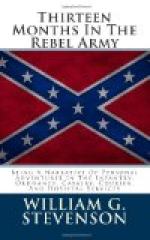During the month of December, sickness in the form of pneumonia and measles became fearfully prevalent, and by the middle of January one-fifth of the army was said to be in the hospital. The prevalence of disease was attributed by the surgeons to the constant rains, the warm winter, and incessant labor day and night on the fortifications.
Though up to this time I had enjoyed uninterrupted good health, the pneumonia now seized me violently; and after a week of “heroic treatment,” I was put into a box-car and started for the hospital at Nashville. This was the dreariest ride of my life thus far. Alone, in darkness, suffering excruciating pain, going perhaps to die and be buried in an unhonored grave, my “Christmas” was any thing but “merry.” And yet the month following my arrival in Nashville was the most pleasant, on many accounts, that I had yet spent in Dixie. I was carefully and tenderly nursed by Drs. Stout and Gambling and the ladies of Nashville, who showed the true woman’s heart in their assiduous care of the poor suffering men, prostrated by disease and home-sickness. Some of the ladies were strong Secessionists; but I thought then, as I believe now, that most of them, not all, would have shown the same kindness to any suffering soldiers who might have come under their notice. I knew my mother would be a Good Samaritan to a dying Rebel; why should not they to wounded Unionists.
In two weeks I was convalescent, and yet I daily exhausted my returning strength by gaining a knowledge of the Nashville founderies, machine-shops, bridges, capitol, industry, and whatever I thought worth visiting.
At this juncture I also found an old friend of my father’s, who with his interesting family did much to make my days of recovery pleasant days; supplying many little things which a soldier’s wardrobe and an invalid’s appetite needed. How much of a Rebel he was I could never exactly make out, but I think his regard for my family held deep debate with either love or fear of the ruling authorities, to settle the question whether he should aid me to reach home. At least, there was not in what he said in our frequent interviews that entire outspokenness which would have prompted me to make a confidant of him; hence I made no headway toward escaping to the North. Indeed, I considered it the only safe way, in talking with him, to show a guarded zeal for the Southern cause, lest, if he were a hearty Rebel, he might betray me. I am now inclined to the opinion that I was too suspicious of him, and that he was at heart a Union man. At all events, I shall ever be grateful for his kindness to me.




